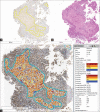The prognostic value of excision repair cross-complementing Group 1 expression in nasopharyngeal cancer patients
- PMID: 32582340
- PMCID: PMC7306241
- DOI: 10.4103/jrms.JRMS_787_18
The prognostic value of excision repair cross-complementing Group 1 expression in nasopharyngeal cancer patients
Abstract
Background: Overexpression of excision repair cross-complementing Group 1 (ERCC-1) is related to cisplatin resistance and defective repair of radiation damage. The purpose of this study was to evaluate the clinical significance of excision (ERCC-1) expression in nasopharyngeal cancer (NPC).
Materials and methods: We conducted a retrospective review of patients diagnosed with NPC between 2000 and 2013. The archived tissues were analyzed using immunohistochemistry to determine ERCC-1 expression. The ERCC-1 expression level along with other clinical factors and overall survival (OS) were analyzed. Hazard ratio (HR) with a 95% confidence interval was calculated to assess the risk.
Results: The analysis of ERCC-1 expression was available in 262 NPC patients who had medical records at our hospital. Among those patients, 221 (84%) were treated with curative radiotherapy (RT)/concurrent chemoradiotherapy, 22 (7%) were treated with palliative RT alone, and 19 (9%) were given best supportive care. There was no correlation between ERCC-1 expression and stage of cancer or OS. No difference in 5-year OS was found between patients with low ERCC-1 expression and high ERCC-1 expression (38% vs. 36%; P = 0.981). The adjusted HR (aHR) of cancer death increased with cancer stage (aHR = 2.93 for advanced Stages III-IV; P = 0.001) and age (aHR = 2.11 for age >55; P ≤ 0.001). ERCC-1 expression exhibited no prognostic significance in our study (aHR = 1).
Conclusion: In this study, ERCC-1 expression has no statistical significance to be considered a prognostic factor for OS among NPC patients. On the other hand, cancer stage, age, and types of treatment can be prognostic factors in NPC patients.
Keywords: Excision repair cross-complementing Group 1; nasopharyngeal cancer; prognostic factor.
Copyright: © 2020 Journal of Research in Medical Sciences.
Conflict of interest statement
There are no conflicts of interest.
Figures



Similar articles
-
Could excision repair cross-complementing group-1 mRNA expression from peripheral blood lymphocytes predict locoregional failure with cisplatin chemoradiation for locally advanced laryngeal cancer?Asia Pac J Clin Oncol. 2020 Apr;16(2):e19-e26. doi: 10.1111/ajco.13239. Epub 2019 Oct 15. Asia Pac J Clin Oncol. 2020. PMID: 31612639
-
Correlation Analysis and Prognostic Impact of (18)F-FDG PET and Excision Repair Cross-Complementation Group 1 (ERCC-1) Expression in Non-Small Cell Lung Cancer.Nucl Med Mol Imaging. 2015 Jun;49(2):108-14. doi: 10.1007/s13139-014-0304-2. Epub 2014 Nov 8. Nucl Med Mol Imaging. 2015. PMID: 26085855 Free PMC article.
-
Prognostic values of excision repair cross-complementing genes mRNA expression in ovarian cancer patients.Life Sci. 2018 Feb 1;194:34-39. doi: 10.1016/j.lfs.2017.12.018. Epub 2017 Dec 13. Life Sci. 2018. PMID: 29247747
-
Predictive value of excision repair cross- complementation group 1 expression in locoregionally advanced nasopharyngeal carcinoma receiving cisplatin-based concurrent chemoradiotherapy.Cancer Biomark. 2018;21(4):875-881. doi: 10.3233/CBM-170817. Cancer Biomark. 2018. PMID: 29439312
-
Testing for excision repair cross-complementing 1 in patients with non-small-cell lung cancer for chemotherapy response.Expert Rev Mol Diagn. 2007 May;7(3):261-8. doi: 10.1586/14737159.7.3.261. Expert Rev Mol Diagn. 2007. PMID: 17489733 Review.
Cited by
-
A multimodal approach for establishing ACTL6A and ERCC1 as chemoresistance genes in locally advanced head and neck cancer.Front Pharmacol. 2025 May 29;16:1541987. doi: 10.3389/fphar.2025.1541987. eCollection 2025. Front Pharmacol. 2025. PMID: 40510426 Free PMC article.
References
-
- Jemal A, Bray F, Center MM, Ferlay J, Ward E, Forman D, et al. Global cancer statistics. CA Cancer J Clin. 2011;61:69–90. - PubMed
-
- Imsamran W, Chaiwerawattana A, Wiangnon S, Pongnikorn D, Suwanrungruang K, Sangrajrang S, et al. Cancer in Thailand. Vol. 8. Bangkok, Thailand: National Cancer Institute; 2015.
-
- Blanchard P, Lee A, Marguet S, Leclercq J, Ng WT, Ma J, et al. Chemotherapy and radiotherapy in nasopharyngeal carcinoma: An update of the MAC-NPC meta-analysis. Lancet Oncol. 2015;16:645–55. - PubMed
-
- Au JS, Law CK, Foo W, Lau WH. In-depth evaluation of the AJCC/UICC 1997 staging system of nasopharyngeal carcinoma: Prognostic homogeneity and proposed refinements. Int J Radiat Oncol Biol Phys. 2003;56:413–26. - PubMed
-
- Chua DT, Sham JS, Wei WI, Ho WK, Au GK. The predictive value of the 1997 American joint committee on cancer stage classification in determining failure patterns in nasopharyngeal carcinoma. Cancer. 2001;92:2845–55. - PubMed
LinkOut - more resources
Full Text Sources
